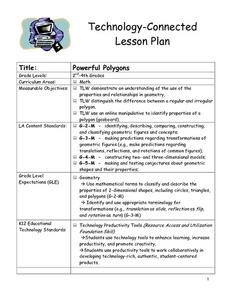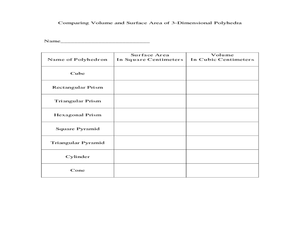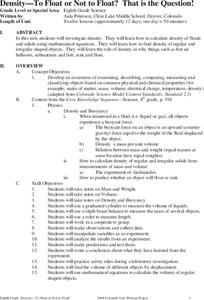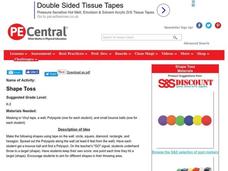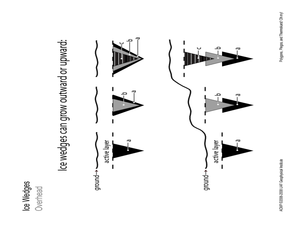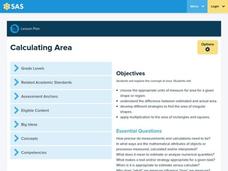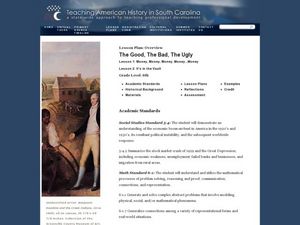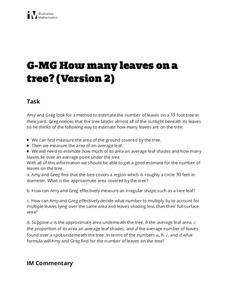Curated OER
Powerful Polygons
Students scan the classroom to find different common shapes. They listen as the teacher defines polygon and regular polygon. The teacher demonstrates regular polygons via the Internet and the "Math is Fun" web site. Students go outside...
Curated OER
The Value of Volume
Students measure the perimeter and area of their polygons. In this geometry instructional activity, students calculate the volume and area using the correct tools. They calculate the time and temperature and the perimeter and side...
Curated OER
Amazing Transpiration
Learners observe a leaf and discuss the way that water is released from a leaf through its stomata. For this water cycle lesson, students calculate how much water leaves produce from a whole tree.
Curated OER
Density - To Float or Not to Float? That is the Question!
Students investigate how to find the density of fluids and solids using math. Students also learn how to find the density of regular and irregular shaped objects.
Curated OER
Does Sunlight Effect Leaf Size?
Students make estimates and then measure leaves for accuracy. They calculate the area of the leaves by drawing an outline on graph paper and counting the squares. They compare the leaves exposed to sunlight to those that are in constant...
Curated OER
Triangle Explorer
Students compute the area of triangles in a computer program. In this measurement lesson plan, students complete 5 easy, 5 medium, and 5 hard problems.
Curated OER
Unit Perimeters and Areas
Students use Geometers SketchPad to find the area and perimeter of several shapes. In this geometry lesson, students determine area of rectangles and progress through irregular polygons. None of the referenced worksheets are included...
Curated OER
Elements of Art
Third graders discover elements in visual art. In this visual art lesson, 3rd graders explore the use of line, shape, and color in visual art. After reviewing works of art, students create unique art pieces. Technology resources provided.
Houghton Mifflin Harcourt
Unit 6 Math Vocabulary Cards (Grade 5)
Acute angles, nets, and vertices are only a few terms that a set of flash cards includes. Among the 108 cards, two types are available; word cards printed in bold-faced lettering, and corresponding definition cards equipped with an...
Curated OER
Cut It Out
Sixth graders derive an original formula for calculating the area of an irregular figure.
Curated OER
A Galactic Fact Sheet
In this galactic fact worksheet, learners read through important facts about galaxies, their shapes, and distances from the Sun.
Curated OER
Perimeter
Students explore the concept of perimeter. In this perimeter lesson plan, students discuss how to find perimeter of various shapes. Students use the Perimeter Explorer applet to find the perimeter of various shapes.
Curated OER
Hickory Dickory Dock
Pupils follow written directions to construct their own tangram. In this tangram activity, students use their tangram to develop original figures that illustrate characters and/or objects from their favorite nursery rhyme. Pupils also...
Curated OER
Perimeter
Students use their hands, feet, computer, and rulers to measure the perimeter of objects. In this measurement lesson plan, students measure objects around the room and computer generated shapes.
Curated OER
Shape Toss
Learners get a bounce ball and find a Polyspot. On the teacher's signal, students underhand throw to a target. They keep their own score: one point each time they hit a target.
Curated OER
Polygons, Pingos, and Themokarst! Oh MY!
Students complete activities to learn about the common land features in Alaska. In this land study lesson, students study an overhead for permafrost features. Students define ice wedge polygons, thermokarst, and pingos. Students also...
Curated OER
Geometry Scavenger Hunt
Learners use the digital camera, identify geometric shapes (in nature as well as man-made), and gain a better understanding of geometric vocabulary. They search for and recognize geometric shapes in unusual settings
Pennsylvania Department of Education
Multiplication Using Arrays
Explore the concept of multiplication by using arrays. Classmates use arrays to gain a better understanding of multiplication. They break arrays apart to model the distributive property of multiplication over addition. The relationship...
Curated OER
The Good, The Bad, The Ugly
Sixth graders examine the causes of the stock market crash of 1929. In this integrated math/history unit on the stock market, 6th graders study, research, and read stocks, visit a local bank, and create a PowerPoint to show the finished...
Illustrative Mathematics
How Many Leaves on a Tree? (Version 2)
A second attack at figuring out the number of leaves on a tree, this activity makes both an excellent follow-up to version 1 and a stand-alone activity. Learners practice setting parameters and deciding acceptable estimate precision, and...
Teach Engineering
Determining Densities
Don't be dense—use a robust resource. The second installment of a five-part Floaters and Sinkers unit has learners determine the densities of several objects. As part of the activity, they learn the displacement method for finding...
Teach Engineering
Floaters and Sinkers
Whatever floats your boat. Young engineers learn about density by measuring the masses and volumes of boxes filled with different materials. Using their knowledge of densities, they hypothesize whether objects with given densities will...
Teach Engineering
Density Column Lab - Part 1
Mass and density — aren't they the same thing? This activity has groups use balance beams and water displacement to measure several objects. The pupils use the measurements to calculate the density of the objects.
Teach Engineering
Density Column Lab - Part 2
Groups suspend objects within layers of liquids to determine the densities of different liquids and compare them to the densities of objects calculated in Part 1. The groups then carefully test their calculations by layering the liquids...


